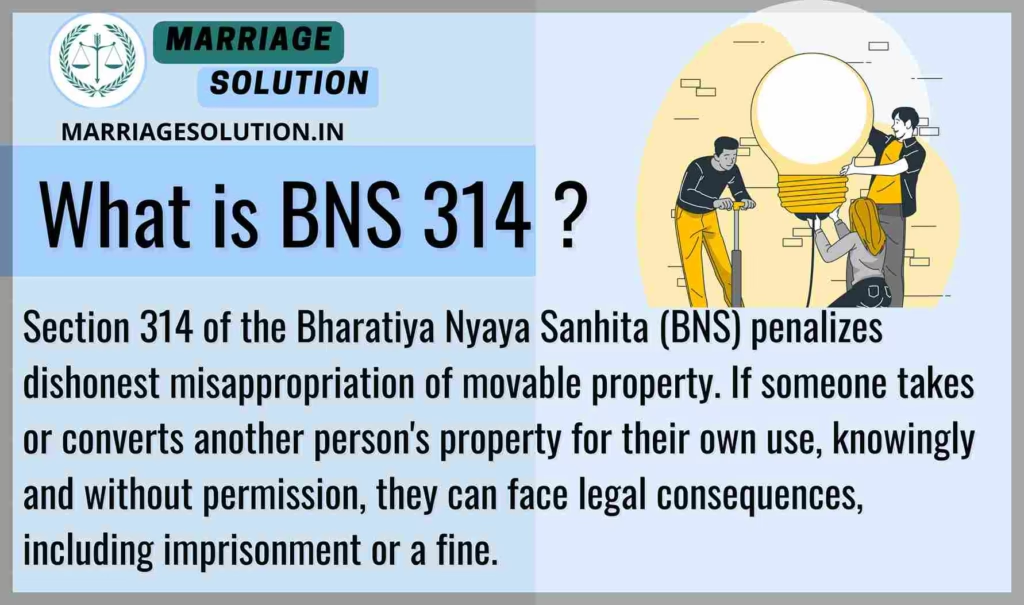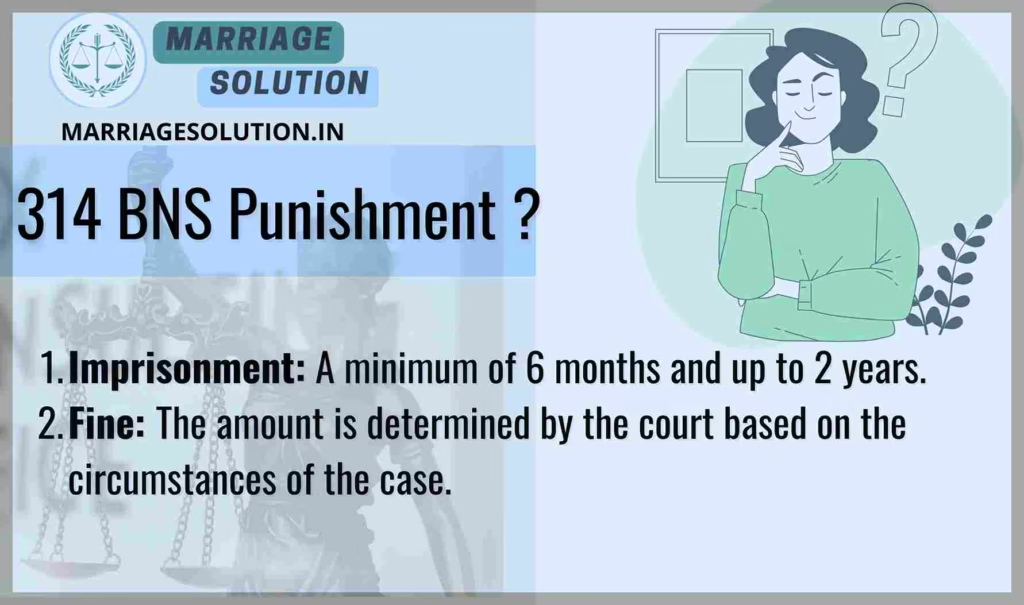Introduction of 314 BNS
314 BNS of the Bharatiya Nyaya Sanhita deals with the offense of dishonest misappropriation of movable property. It applies when a person knowingly takes or converts someone else’s property for their own use without permission. Even finding lost property and keeping it dishonestly without attempting to return it falls under this provision. The section ensures protection of ownership rights and discourages individuals from taking undue advantage of another’s belongings.
The Bharatiya Nyaya Sanhita (BNS) Section 314 replaces the old Indian Penal Code (IPC) Section 403.
What is BNS Section 314 ?
Section 314 of the Bharatiya Nyaya Sanhita (BNS) penalizes dishonest misappropriation of movable property. If someone takes or converts another person’s property for their own use, knowingly and without permission, they can face legal consequences, including imprisonment or a fine.

Under Section 314 of the bns act 2023
“Whoever dishonestly misappropriates or converts to his own use any movable property belonging to another person, shall be punished with imprisonment which may extend from six months to two years, or with fine, or with both.”
1. Meaning of Dishonest Misappropriation
This section criminalizes the act of taking or using another person’s movable property without permission and with dishonest intent.
- Misappropriation means wrongful use or conversion of property.
- The act becomes punishable when done knowingly and dishonestly.
- Even temporary use with dishonest intention falls under this offense.
2. Who is Covered?
- Finders of Lost Property → If a person finds lost property and does not attempt to find the owner but uses it, they are guilty.
- Employees/Agents → Misusing property entrusted to them.
- Individuals → Taking movable assets like vehicles, money, jewelry, or documents without permission.
- Anyone using property dishonestly → Even for a short time, like pawning someone’s asset for personal gain.
3. Nature of the Offense
- Cognizable / Non-Cognizable → Non-cognizable (police need Magistrate’s order to arrest/investigate).
- Bailable / Non-Bailable → Bailable (accused has the right to bail).
- Compoundable / Non-Compoundable → Non-compoundable (cannot be settled privately).
- Triable By → Any Magistrate.
4. Examples of BNS Section 314
- Example 1 – Found Property Misuse
A finds a lost mobile phone and instead of locating its owner, sells it for money. → Offense under BNS 314. - Example 2 – Conversion for Personal Use
B mistakenly takes C’s book but later knowingly sells it for profit. → Misappropriation. - Example 3 – Temporary Misappropriation
D takes his colleague’s gold chain and pledges it for a loan, planning to return it later. → Still punishable.
5. Punishment under BNS Section 314
- Imprisonment → Minimum 6 months, up to 2 years.
- Fine → Court may impose additional monetary penalty.
- Both → In serious cases, both imprisonment and fine may be awarded.
6. Importance of BNS Section 314
- Protects individuals’ ownership rights.
- Encourages honesty in cases of found property.
- Prevents misuse of entrusted or lost property.
- Maintains social trust and accountability.
- Distinguishes between genuine mistakes and dishonest acts.
Section 314 BNS Overview
BNS Section 314 deals with dishonest misappropriation of property. If someone takes or converts any movable property belonging to another person for their own use, without the owner’s permission and with dishonest intent, it becomes an offense under this section. It ensures protection of ownership rights and punishes those who misuse or take advantage of another person’s belongings.
BNS Section 314 Explained in 10 Key Points
1. Definition of Dishonest Misappropriation
Dishonest misappropriation means taking or using another person’s movable property without permission and with the intention of keeping it for personal benefit. This act becomes punishable under Section 314 when done knowingly or deliberately. For example, finding someone’s wallet and not attempting to return it, but instead using the money, falls under this section.
2. Applicability of the Section
This section applies only to movable property, such as money, vehicles, jewelry, or other physical items that can be moved. Immovable properties like land and houses are not covered under this law. It ensures protection for property owners against unauthorized use of their possessions.
3. Finding Lost Property
If a person finds a lost item and does not attempt to locate its rightful owner but instead keeps it for personal use, they may be charged under this section. For example, if someone finds a gold ring and sells it without trying to find the owner, it is a violation of Section 314.
4. Role of Intent in Misappropriation
Intent plays a crucial role under this section. If someone takes another person’s property mistakenly but later keeps it knowingly and dishonestly, they can be held guilty. For example, taking a book from a friend’s house, thinking it belongs to you, but later selling it knowingly, becomes an offense.
5. Punishment Under Section 314
The punishment for violating this section includes imprisonment of not less than 6 months, which may extend up to 2 years, along with a fine. The fine amount is decided by the court based on the case. This strict punishment ensures that people think twice before misusing someone else’s property.
6. Explanation of Temporary Misappropriation
Even temporarily taking or using someone’s property dishonestly is considered a violation. For example, taking a government bond belonging to another person, pledging it for a loan, and planning to return it later is still punishable under this section.
7. Classification of Offense
The offense under Section 314 is non-cognizable, meaning police cannot register a case or arrest the accused without prior approval from a Magistrate. This classification ensures that the accused gets a fair chance to defend themselves.
8. Bailability of the Offense
Section 314 is a bailable offense, which means the accused has the right to secure bail easily. This classification recognizes that the offense, while serious, is not as grave as some other crimes under the law.
9. Examples Covered by the Section
A person finds a purse with money but doesn’t attempt to find the owner and uses the money for personal gain. Another person discovers a blank-signed cheque belonging to someone and uses it for their benefit. Both cases are punishable under Section 314.
10. Fair Use of Found Property
If someone finds an item and keeps it with the intent to protect it until the rightful owner is found, they are not guilty under this section. However, if they knowingly use or sell the item before attempting to find the owner, they are committing an offense.
Examples of BNS Section 314
Example 1:
A finds a wallet on the street containing cash and identification documents. Instead of trying to return it to the owner by using the contact information available, A decides to keep the money and throw away the wallet. This is a violation of BNS Section 314, as A dishonestly misappropriates someone else’s property.
Example 2:
B discovers a valuable gold necklace in a park. Without making any effort to locate the rightful owner, B sells the necklace and keeps the proceeds for personal use. B has committed an offense under BNS Section 314 by knowingly converting the property to personal use without any attempt to return it.
BNS 314 Punishment
- Imprisonment: A minimum of 6 months and up to 2 years.
- Fine: The amount is determined by the court based on the circumstances of the case.

BNS 314 bailable or not ?
The offense under Section 314 is bailable, meaning the accused can secure bail as a right without stringent court approval.
Comparison: BNS Section 314 vs IPC Section 403
| Section | Offense | Punishment | Bailable / Non-Bailable | Cognizable / Non-Cognizable | Trial By |
|---|---|---|---|---|---|
| BNS Section 314 | Dishonest misappropriation or conversion to one’s own use of movable property belonging to another (including found property kept/used dishonestly). | Imprisonment from 6 months to 2 years, or fine, or both. | Bailable | Non-Cognizable | Any Magistrate |
| IPC Section 403 (Old) | Dishonest misappropriation of property (older IPC wording covering conversion of movable property dishonestly by a person entrusted with it or who finds it). | Imprisonment which may extend to two years, or with fine, or with both. | Bailable | Non-Cognizable | Any Magistrate |
| Note: | |||||
BNS Section 314 FAQs
What does BNS Section 314 cover?
It covers dishonest misappropriation of movable property or converting it to one’s use without legal authority or justification.
What is the minimum punishment under this section?
The minimum punishment is 6 months of imprisonment.
Is Section 314 bailable?
Yes, the offense is bailable, allowing the accused to secure bail.
What is the classification of the offense?
It is a non-cognizable, non-compoundable offense triable by any Magistrate.
Can a finder of lost property be guilty under Section 314?
Yes, if the finder does not attempt to return the property to its rightful owner and dishonestly keeps it for personal use.
Conclusion
BNS Section 314 plays an important role in safeguarding property rights by punishing dishonest misappropriation. It covers cases where individuals misuse, keep, or convert movable property belonging to others for personal gain. With penalties ranging from six months to two years of imprisonment along with fines, the section deters dishonest conduct and promotes accountability. By addressing even lost property misappropriation, the law ensures fairness and discourages wrongful enrichment at the expense of rightful owners.
Need Legal Support?
If you are dealing with court cases, marriage problems, or any other legal issue, our team at Marriage Solution – Lawyer Help is here for you. Simply fill out our quick online enquiry form, and we’ll connect you with the right legal expert to support your needs.
Finished with BNS 314 ? Continue exploring the next provisions of the Bharatiya Nyaya Sanhita (BNS), 2023. Each section includes explanations, examples, and plain-language breakdowns for easy understanding.
- 315 BNS :Dishonest misappropriation of property possessed by deceased person at the time of his death.
- https://marriagesolution.in/bns_section/315-bns/
Of Criminal Breach of Trust.
- 316 BNS : Criminal breach of trust.
- https://marriagesolution.in/bns_section/316-bns/
Of Receiving Stolen Property.
- 317 BNS : Stolen property.
- https://marriagesolution.in/bns_section/317-bns/
Of Cheating.
- 318 BNS : Of Cheating .
- https://marriagesolution.in/bns_section/318-bns/
- 319 BNS : Cheating by personation.
- https://marriagesolution.in/bns_section/319-bns/
Full IPC Section List: https://marriagesolution.in/ipc-section-list
All Indian Law & Blogs: https://marriagesolution.in/indian-law/
Full BNSS Section List: https://marriagesolution.in/bnss_section-list
